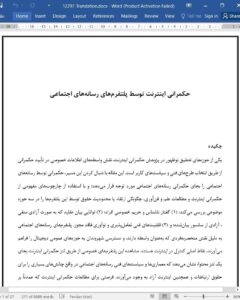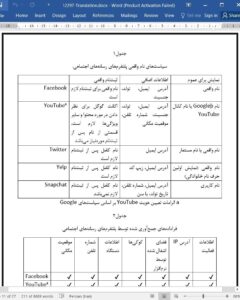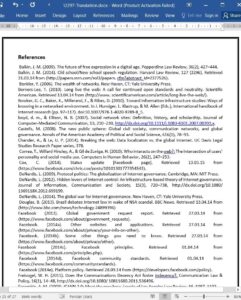Abstract
An emerging area of inquiry in Internet governance scholarship is the role of private information intermediaries in enacting governance via technical design choices and user policies. Following this trajectory, this paper addresses governance by social media rather than governance of social media. Informed by conceptual frameworks from Internet governance and Science and Technology Studies, it examines the extent to which these platforms either promote or constrain rights in three thematic areas: (1) anonymous speech and individual privacy; (2) the ability to express ideas or, stated as a negative liberty, freedom from censorship; and (3) technical affordances of interoperability and permissionless innovation. Because of their unique role as the intermediaries providing citizens with access to the digital public sphere, social media platforms are central points of control on the Internet. Viewing these private platforms through an Internet governance lens, rather than a content lens, suggests that social media technical architectures and policies actually pose several challenges to communication rights as well as to the open Internet. There is an opportunity for Internet governance studies, which have primarily focused on governmental policies and new global institutions, to give greater consideration to the direct policymaking role of private intermediaries and the accompanying phenomenon of the privatization of human rights.
1. An Internet governance lens into social media platforms
Much scholarship related to the politics of social media has focused on content and usage issues, such as the salutary relationship between social media and political transformation (Howard et al., 2011), the use of these platforms for selfrepresentation (boyd & Ellison, 2007; Correa, Willard Hinsley, & Gil de Zuniga, 2010; Gray, 2009, Marwick & boyd, 2010; Tufekci, 2008), and ways in which social media usage expands freedom of expression and facilitates new forms of citizen journalism, alternative media, and dissent (Lynch, Freelon, & Aday, 2014). These inquiries are primarily focused on content rather than the less visible area of the technical infrastructure supporting social media content.
5. The social media challenge to Internet governance
Given their significant role as intermediaries providing citizens with access to the digital public sphere, social media platforms are central points of control on the Internet. By comparatively examining how social media platforms enact governance in the three thematic areas mentioned in this research paper – privacy, expression as well as interoperability and permissionless innovation – it becomes clear that there are several interfaces in which these companies exert direct power over online rights. They interface directly with content via their ability to delete or block content at will; with subscribers, via the technological affordances of system design and via terms of service; with governments, by serving as the intermediaries that carry out delegated law enforcement and delegated censorship; and with other institutions, via protocols, business models and technological interfaces. Each of these interfaces can be viewed as an information choke point determining how information flows. In short, the governance role of social media platforms is not only entrenched, it takes place in various ways outside of what most view as the policy role of terms of service and other user agreements.










